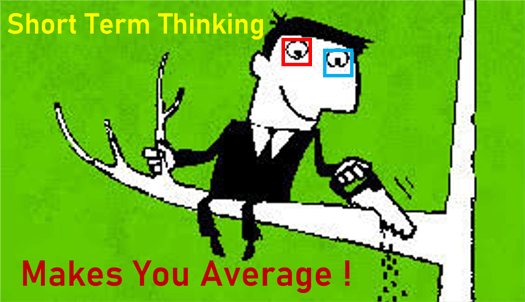Being Average =Short Term Thinking!
Reading Time: 25 minutes.
Think about these facts around you:
–Why diet plans for losing weight are more popular than making long-term lifestyle changes?
-Why the frequent change of a functional mobile-phone for one small additional feature is more popular than saving money on a regular basis!
-Why managers focus more on quick sales and not on sustainable sales!
-Why trading is more popular than long term investing in stock markets?
-Why in India,penetration of alcohol is higher than penetration of insurance & mutual-funds?
-Why companies sacrifice long term goals while focusing on quarterly targets?
If we think deeply about all of the above questions, we realise that solutions with immediate strong temptations strike us as much more attractive than solutions with less immediate results — even if those benefits will be many times greater later!
Where does it lead ?
In most of the cases, people tend to regain weight after they stop following the strict regime of diet plans. Individuals get into the debt trap of credit-cards or throw away their life- savings by constantly buying or upgrading certain fancy gadgets which are not necessary. People get into stock-markets to make quick bucks ,with a short-term perspective, and end up burning their hard-earned money. Companies take debt, manipulate sales as well as balance-sheets to en-cash short term opportunities! Nearly 3 out 10 companies (29%) have fallen off the Fortune 500 list for the ten years spanning 2007 to 2017 -many of these lost their ranking because they failed to realise the negative consequences of their short-term actions. Even climate change is the consequence of our short term priorities.
And the worse part is that short term thinking is getting shorter. To paraphrase the investor Esther Dyson: in politics, the dominant time frame is a term of office, in fashion and culture it’s a season, for corporations it’s a quarter, on the internet it’s minutes and on the financial markets mere milliseconds.
How short-term thinking makes you an average person?
While reading Tony Robbin’s all-time classic ‘Awaken The Giant Within‘, I stumbled across a powerful quote that got me thinking:
“Most of the challenges that we have in our personal lives come from a short-term focus” — Tony Robbins
If you compare the people who’re highly successful on a consistent basis with average performers, you can quickly identify a big difference. The most successful people are almost always long-term oriented, while most average performers (and especially under-performers) are short-term oriented.
Where highly successful tend to act more in alignment with their long-term goals and values, average performers tend to seek more short-term pleasures. This preference for ‘instant gratification’ is exactly what causes major problems in life.
It’s all too common that this short-term focus leads to things like bad health, low productivity, weak financial status, and failure to achieve big and ambitious goals.
The strangeness of life !
Strangeness of life lies in the fact that the majority of the adult population knows about these facts, but refuses to act upon it!
Sounds weird? Well, most of us ,including you & me, also happen to do the same.
In short, short-term thinking is a long term problem !
Despite having several compelling examples of benefits of long-term thinking, the ‘now’, ‘instant-fixes’ and ‘temptations’ command so much more attention and resources. And that is the reason that the majority of us happen to end up as part of the crowd, we live and die as average persons.
One example is global wealth distribution, have a look at the following pyramid :

The pyramid shows that half of the world’s net wealth belongs to the top 1%, top 10% of adults hold 85%, while the bottom 90% hold the remaining 15% of the world’s total wealth.
This is one of the proofs that majority comprises of average people and they lie at the bottom of the pyramid.
Why Do People Pick Short-term Temptations Over Long-Term Success?
Well, we have few excuses for all of us .
Yes , as an average person we tend to find some excuse for us being average.Sometimes it is luck, sometimes it a bad boss , sometimes we blame our genes!
Yes,we’ve found something to blame for us being average, to justify our average life as well as behaviour.
In the real sense, we all are against odds, we’re pitted against few things that lead us to have a preference for short-term-fixes and to under-value future-rewards!
On serious note, would like to mention that if we can know the real causes, there’re chances that we can minimise the effects. We all know that it is easier to resist if we’re aware about the reasons rather than fighting or living in dark ,without knowing our enemy!
Three Villains!

Here are 3 enemies which act against us and force us to live an average life, the enemies of long-term-success.
These are :
i) Biology
ii) Society & Technology
iii) Psychology
Let’s see how they cause nonalignment between our ‘present self’ and ‘future-self’!
i) Biology : a) Evolution: Some of the blame goes to our evolution!
The world early humans would have experienced was vastly different from today’s world.
Our brains have evolved to react to short-term crises, such as an attack by a hungry lion. In those days, short-term survival was the need of the hour- getting next food, fear of getting attacked by an animal, outlive next drought or flood!
Every need had to be fulfilled by sheer physical effort, there was no money to buy anything. Life was all about today and about immediate tomorrow. And there was no money to be saved for future needs – medical expenses, children’s education or for paying future bills of electricity, water or WiFi!
This resulted in human brains having very less ability to assess and respond appropriately to longer-term threats or needs. As a result, we are very good at responding quickly to an emergency, but we are hopelessly inept, both as individuals and as a society, when it comes to taking effective action to face the threats or opportunities which are perceived as being distant.
In his 2004 book ‘A Short History of Progress, Ronald Wright aptly describes human beings in today’s world as running 21st-century software on fifty thousand-year-old hardware.
We’ve evolved in such a way that long term risk of our current behaviour is hard to “see”, compared to the immediate benefit. Our nervous system is tuned, for now, not then
The result: Instead of considering the possible impacts of a course of action over the long term, we think about what might happen today, tomorrow or next week.
Sometimes we get away with this, and we simply need to act to fix a problem or take an opportunity now. The real issue occurs when the consequences of our actions or inaction lie hidden, and negative consequences emerge over the longer term.
b) Our body’s energy consumption pattern and how our brain works!
For an average adult in a resting state, the brain consumes about 20 percent of the body’s energy. The brain’s primary function, processing & transmitting information through electrical signals, is very, very expensive in terms of energy use. Keep in consideration that the brain is just 2% of our body mass but this organ consumes 1/5th of available energy.
And unlike muscles, which can store excess carbohydrates, the brain needs to be constantly supplied with oxygen and energy in order to run properly.
Now think about it in the context of our evolution process, the days when getting next food huge physical efforts (hunting or gathering) -this resulted in our body developing a trait known as energy conservation. Because the next source of energy ( food) required a lot of pains and efforts, the human body tended to minimise the use of already available energy!
A study from the University of British Columbia (UBC) says that “Conserving energy has been essential for humans’ survival, as it allowed us to be more efficient in searching for food and shelter, competing for sexual partners, and avoiding predators,”
(this is one of the reasons our brains prefer lying on a couch as opposed to going to a gym )
Now combine this with what Nobel Laureate Mr Kahneman has to say about the brain. He famously introduced t the idea of dual-process theory in his 2011 bestseller, Thinking Fast and Slow.
In this book, he tends to suggest that we have two system way of thinking :
System 1 (Thinking Fast)
System 2 (Thinking Slow).
System 1 is the intuitive, “gut reaction” way of thinking and making decisions.
System 2 is the analytical, “critical thinking” way of making decisions.
System 1 forms “first impressions” and often is the reason why we jump to conclusions.
System 2 does reflection, problem-solving, and analysis.
Somehow energy consumed in System 1 thinking is much lesser as compared to System 2 as System 1 relies on previously stored data in our brain.
Examples:
Have a look at any picture or person!
You may come out with several conclusions about that picture or person in an instant, you don’t need to think hard, hence brain does not need to consume much energy. This is the job of System 1.
Now try to calculate 33 X 44 without using a calculator!
You would realize that your brain needs to work extra hard, there’s no immediate answer as no previous data is available in the brain. Hence the brain needs to spend energy to find an answer. This is how System 2 works.
The result: Long term thinking requires analysis and critical thinking whereas our body and brain are hard-wired to conserve energy thus prompting us to avoid long-term thinking.
ii) Society & Technology
a) Rising consumerism –the human desire to own and obtain products and goods in excess of one’s basic needs. Basic needs typically refer to having sufficient food, clothing, and shelter.
Go out of your home and it is hard to miss large signs that enticingly announce: “Sale of up to 50 percent” or “Clearance sale. Everything must go!”
Go online, and these advertisements would follow you on every click, promising discounts on first purchases, hefty discounts on hotels, beauty products and what not!
There are constant hooks and temptations, compelling us to get indulged in short term pleasures.
b) Society Pressure,Show-Offs, Efforts to look Successful
On the professional front, the pressure to produce short-term results has increased in the last five years, according to 63 percent of global executives who responded to a recent McKinsey & Company survey.
On the personal front, your success is measured on how fast you can have a big house, which car you own or which brand of watch you wear etc.
And as an average soul, we tend to fall in this trap!
A big car , a new smart phone is a visible to your neighbors and relatives whereas nobody would know about your medical insurance or mutual fund investments ! But we want to be visible, we want to show our new toys on FB & Instagram , otherwise where’s the fun!
More we try to differentiate ourselves by spending more & more on the latest gadgets by stretching our resources, using a credit card for buying the latest smartphone, more we fail our long term financial goals.
Despite we had a mental faculty to look & plan ahead, we have a weakness in our thinking called “what others would say”, which favours short-term payoffs over long-term rewards.
Some psychologists use the metaphor of a “horse and rider” to describe the tension between our rationality and urges: the rider knows it’s smart to think longer-term, but the horse has its own ideas as a horse wants to please the spectators.
c) Technology :
It’s no secret that most of the companies we do business with have a vested interest in keeping us focused on the short-term.
Facebook, Twitter, Instagram wants us to scroll all day round! Netflix, HBO, Apple TV, cable networks, sports channels want us to forget everything else & keep offering sticky content.
By the way, this doesn’t make companies evil, they’re just being clever. Most companies are trying to maximize their profit, and they’re going to present their product or service to us in the best light possible relative to this goal. But as a consumer, we have the power, and it’s up to us to see through their cleverness.
Result :Try to count the number of hours you spent in last one year on any of the above app, and now think of any skill that you would have mastered in a similar time or think about how much healthy one would be if similar hours were spent in a gym or in running.
Try to calculate the expenses that were done on status-symbols vs. impact of that money in long term if you had invested it !
Try to calculate the cost of short -term pleasures vs. long term goals.
iii) Psychology
In the late 1960s, psychologist Walter Mischel and his colleagues at Stanford University conducted a series of studies on delayed gratification, known as the marshmallow experiment. The researchers presented four- and five-year-old preschool children with one marshmallow apiece and told them that they had two options: They could ring a bell at any point to call the experimenter and eat the marshmallow, or they could wait until the experimenter returned, usually about 15 minutes later, to get an extra marshmallow.
In other words, the children had to choose between a small immediate reward and a larger later one.
Mischel and his team published their initial results on delayed gratification in 1972, but the more interesting findings came in follow-up studies with the same group of kids over the next several decades. When the kids were reevaluated as teenagers and adults, those who had exhibited stronger self-control by waiting to eat the first marshmallow had higher SAT scores and lower body mass, and they used fewer drugs.
Their ability to let go of a short-term reward in favour of a higher future payoff seems to have contributed to their doing better later in life.
Result :It’s exactly how most of us work in our lives.
We respond to the hot flame, not the gradual changes. It’s how most people handle finances. It’s how most people handle their health. It’s how most people handle their relationships. It’s how most people handle their time.
What we can about it?
If we cannot really trust our own brains, our society, our psychology, what then?
We have two allies in dealing with our own limitations. First, we must recognize this way that our brains will trip us up, and be prepared to work around it.
We must recognize that our brains will look for short-term gains and will not easily “see” the long-term risk. Watching a movie will “look” more attractive than getting 15 minutes of exercise, almost every time.
Thus, our first ally in dealing with our own evolutionary & behavioural short-sightedness is awareness. We must ask ourselves, at least for major decisions like health or finance or career if we’ve missed some long-term gains or risks because of how our brains typically operate.
The other ally is our System 2, which helps us to do critical thinking, to analyze. But it can only work if we pause before falling for short-fixes.
But we need to make a specific effort to think this way. Our brains do not automatically work in long-term mode, and instead, tend to work in the short-term mode as a rule.
The knowledge which you got today from this article can be your competitive advantage but only if you act upon it.
11 claps





Great article ,
Not just our brain Even Society continuously strives to make us an average person .
Great read !
Nice article . These short reads are like reading crux of a book.
Effective long term results require long term commitment, which most of us lack and this also becomes one of the reasons for short term, though average thinking. Fire fighting and jugaads are all outcome of short term fixes.
How our System 1 and 2 works has been extensively described in the book Thinking, Fast and Slow by Daniel Kahneman. As mentioned in the article too, our brain is hard wired to take an easy route and System 1 always works in that, avoiding any attempt to be more logical.
For companies to have effective long term vision, they can have focused separate team working on it, while the regular business is not effected.
And for an individual, defining priorities and goals are more important. Though easier said then done. Gains come with pain.
Nice article . It will really help to focus on long term thinking and definitely it will give better mileage in any field.
[…] But be wary of taking short-cuts in life, in the long-run short-cuts don’t lead you anywhere. […]
Very informative article.
Thank you.
Hi Pran – appreciate your personal blog page.
I trust, your blog will give opportunity to many professionals – learn, imbibe and adopt to grow and sustain.
Being Average=Short Term Thinking is nicely articulated with examples and figures.